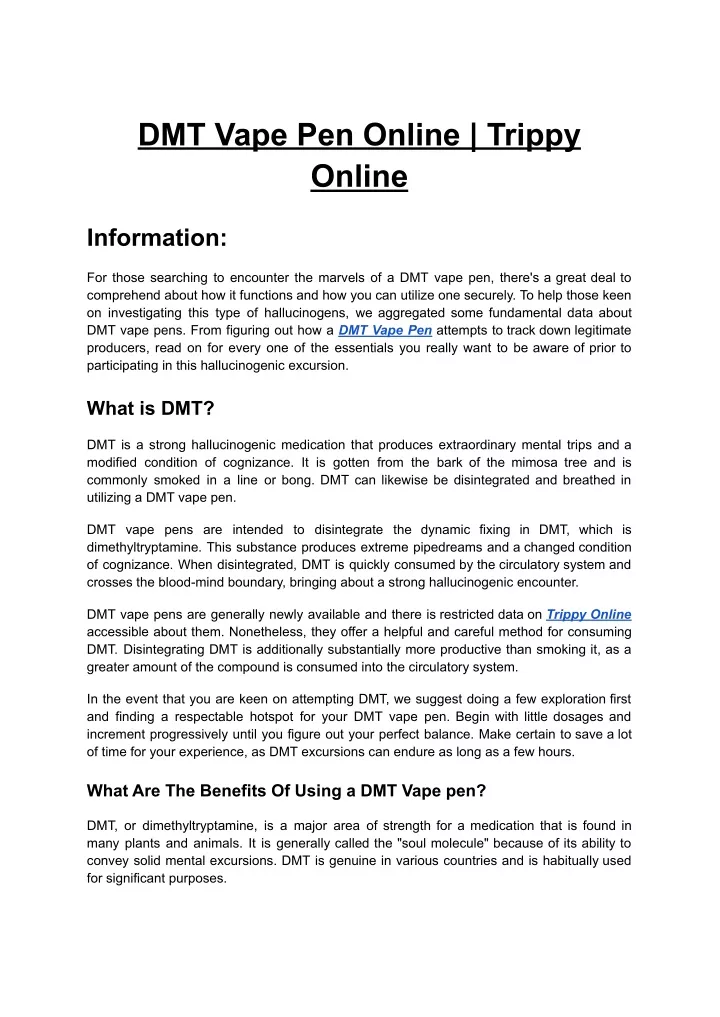 The realm of psychedelic substances has witnessed a significant shift with the integration of modern technology and e-commerce. Among these developments, Dimethyltryptamine (DMT), a naturally occurring psychedelic compound renowned for its intense psychoactive effects, is now being sold in the form of vape pens on various online platforms. This observational research delves into the trends, consumer behavior, and legal intricacies surrounding the online sales of DMT vape pens.
The realm of psychedelic substances has witnessed a significant shift with the integration of modern technology and e-commerce. Among these developments, Dimethyltryptamine (DMT), a naturally occurring psychedelic compound renowned for its intense psychoactive effects, is now being sold in the form of vape pens on various online platforms. This observational research delves into the trends, consumer behavior, and legal intricacies surrounding the online sales of DMT vape pens.DMT, traditionally consumed through methods like direct smoking or as a component of ayahuasca brews, has found a new vehicle: the vape pen. This mode of consumption offers a discreet and accessible means for users to experience the profound and often transformative effects of DMT without the conspicuousness or preparation required for traditional methods. The ease of use, portability, and controlled dosing are key factors that have contributed to its popularity in the online market.
Consumer Demand and Market Growth
The surge in popularity of DMT vape pens can be traced back to growing interest in psychedelic therapies and the rise of microdosing. Users seek personal enlightenment, mental health solutions, or simply curious exploration of altered states of consciousness. Online forums and social media platforms are abuzz with discussions about experiences and the best sources for purchasing DMT vape pens. Through keywords and hashtags, potential buyers navigate the depths of the internet to find these products, reflecting a robust, community-driven market.
Online Sales and Distribution Channels
The sale of DMT vape pens online operates in a gray zone. Several websites and underground online vendors market these products discreetly to circumvent legal barriers. These transactions often require cryptocurrencies or other secure digital payment methods to protect the anonymity of the buyer and seller. The distribution chain remains opaque, with many online stores providing minimal information about the product origins or their manufacturing processes.
Legal Perspectives and Challenges
DMT is classified as a Schedule I controlled substance under the United States Controlled Substances Act and similarly under many other national jurisdictions, making its sale, purchase, possession, and use strictly illegal and punishable by severe penalties. However, the online proliferation of vape pens has posed significant challenges for law enforcement due to the difficulty in monitoring and regulating the virtual marketplace.
Legal ambiguities also arise with the advertisement and sale of these products under euphemistic labels or as ostensibly "legal" variations which purport to contain only naturally-derived or non-synthetic DMT. These grey market strategies have made it exceedingly difficult to enforce existing drug laws and have opened discussions on the need for updated legislation and more comprehensive digital surveillance techniques.
Consumer Safety and Health Implications
The health implications of using DMT through vape pens are still a subject of much debate. Vaping allows the compound to bypass the digestive system and enter the bloodstream directly through the lungs, resulting in a rapid onset of effects, often within seconds. This method of delivery is not without risks, including potential for overuse and a lack of understanding about appropriate dosages.
Moreover, the unregulated nature of the online market raises concerns about product purity and safety. There is no assurance that the vape pens contain a safe concentration of DMT, free from harmful additives or contaminants. The lack of consumer protection and oversight in this budding industry could potentially result in serious adverse health outcomes.
Cultural and Ethical Considerations
The commercialization of Order DMT Vape Pen online through vape pens also touches on broader cultural and ethical issues. For indigenous communities, DMT is considered a sacred element of spiritual and healing practices, and its commercial exploitation can be viewed as cultural appropriation. Furthermore, the ease of access to such a powerful psychedelic through online purchases raises ethical concerns about uninformed or irresponsible use, potentially trivializing what many consider to be a profound transformative experience.
Conclusion
The sale of DMT vape pens online highlights the intersection of technology, commerce, and drug culture in modern society. While offering new possibilities for accessibility and user control, it also brings forth significant legal, health, and cultural challenges that need to be addressed. As digital markets continue to evolve, so too must our understanding and regulations of such potent substances. Future research and policy-making will need to tread carefully, balancing individual freedoms with public health and cultural integrity. The dialogue between technology and tradition is ongoing, and its resolution will shape the future landscape of psychedelic use and research.